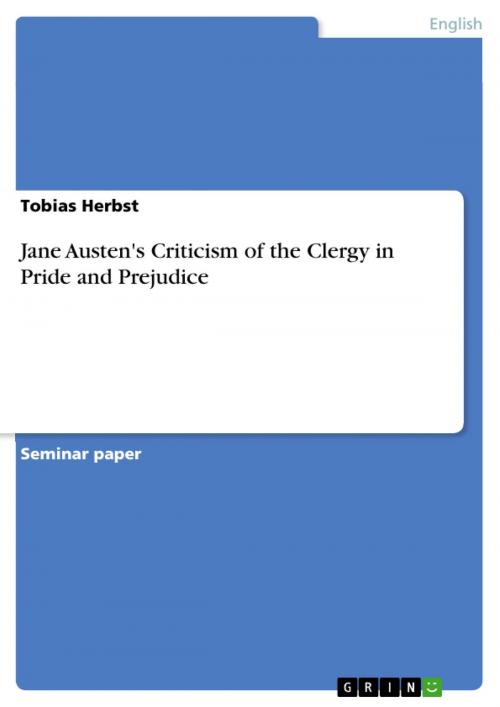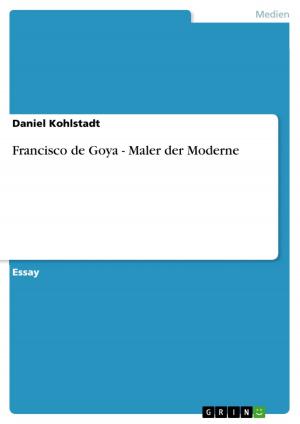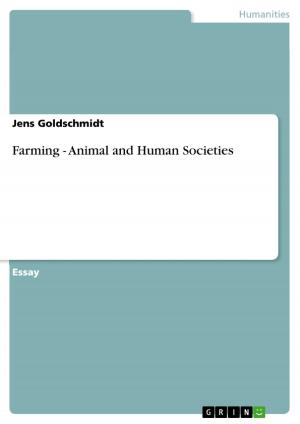Jane Austen's Criticism of the Clergy in Pride and Prejudice
Fiction & Literature, Literary Theory & Criticism, British| Author: | Tobias Herbst | ISBN: | 9783638572361 |
| Publisher: | GRIN Verlag | Publication: | November 22, 2006 |
| Imprint: | GRIN Verlag | Language: | English |
| Author: | Tobias Herbst |
| ISBN: | 9783638572361 |
| Publisher: | GRIN Verlag |
| Publication: | November 22, 2006 |
| Imprint: | GRIN Verlag |
| Language: | English |
Seminar paper from the year 2005 in the subject English Language and Literature Studies - Literature, grade: 2,0, University of Kassel (FB 02 Sprachwissenschaften Institut für Anglistik), 9 entries in the bibliography, language: English, abstract: Pride and Prejudice is nowadays regarded as Jane Austen's most enduringly popular novel. It was first published in 1813 and is a rewritten version of her earlier work First Impressions which had been refused for publication in 1797. 1 Jane Austen worked on this novel during her most productive time, the first two decades of the nineteenth century. The setting of 'Pride and Prejudice' falls also to the time she lived and therefore delivers a detailed depiction of the existing society. The novel tells not only the story of love between the wealthy aristocrat Mr. Darcy and the intelligent Elizabeth Bennet, but also describes rural life in 'Regency England' with its ideas of values and virtues. Considerations of a class society are omnipresent in the novel and social position was established in terms of families, not individuals. Generally in those times, the family had a higher rank than today and was principally responsible for the intellectual and moral education of children. In Pride and Prejudice Austen portrays a world in which society took an interest in the private virtue of its members, mainly considering marriage. Especially the church played an important role here. As religion was an important factor of that age, the clergy also had a significant role in Pride and Prejudice and is represented by the obsequious rector Mr. Collins. As he is the only clergyman in the novel, Jane Austen expresses all her criticism considering the clergy through his character. Therefore the main part of this term paper concentrates on the way how Mr. Collins is presented in the novel. Afterwards, Austen's crucial way of presenting him will lead to a general depiction of her criticism of the clergy, as she accuses Mr. Collins only superficially. In order to understand Jane Austen's relation to the clergy, it is necessary to have a closer look at her clerical background. [...]
Seminar paper from the year 2005 in the subject English Language and Literature Studies - Literature, grade: 2,0, University of Kassel (FB 02 Sprachwissenschaften Institut für Anglistik), 9 entries in the bibliography, language: English, abstract: Pride and Prejudice is nowadays regarded as Jane Austen's most enduringly popular novel. It was first published in 1813 and is a rewritten version of her earlier work First Impressions which had been refused for publication in 1797. 1 Jane Austen worked on this novel during her most productive time, the first two decades of the nineteenth century. The setting of 'Pride and Prejudice' falls also to the time she lived and therefore delivers a detailed depiction of the existing society. The novel tells not only the story of love between the wealthy aristocrat Mr. Darcy and the intelligent Elizabeth Bennet, but also describes rural life in 'Regency England' with its ideas of values and virtues. Considerations of a class society are omnipresent in the novel and social position was established in terms of families, not individuals. Generally in those times, the family had a higher rank than today and was principally responsible for the intellectual and moral education of children. In Pride and Prejudice Austen portrays a world in which society took an interest in the private virtue of its members, mainly considering marriage. Especially the church played an important role here. As religion was an important factor of that age, the clergy also had a significant role in Pride and Prejudice and is represented by the obsequious rector Mr. Collins. As he is the only clergyman in the novel, Jane Austen expresses all her criticism considering the clergy through his character. Therefore the main part of this term paper concentrates on the way how Mr. Collins is presented in the novel. Afterwards, Austen's crucial way of presenting him will lead to a general depiction of her criticism of the clergy, as she accuses Mr. Collins only superficially. In order to understand Jane Austen's relation to the clergy, it is necessary to have a closer look at her clerical background. [...]















